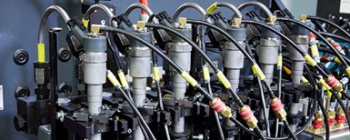
Remanufactured Injectors
The importance of IMA injector coding
Diesel market developments:
UK New Vehicle Registrations 2007 – 2013
2013 UK registrations by Fuel type:

• Source SMMT motor Industry facts 2014
With ever increasing emissions legislation and tightening of limits, vehicle manufacturers have been forced to more accurately control the flow of fuel going into the engine to optimise the efficiency of the combustion process and control emissions within acceptable limits. Since August 2010 diesel vehicles have accounted for over 50% of new vehicle sales into the UK. This has a knock on affect to the aftermarket, these vehicles are now out of the vehicle manufacturers warranty and onto their 2nd /3rd owners. In the past independent workshops could afford to turn diesel business away, doing so now means they are losing potentially 40% of their customer base.
The Diesel injection process
Diesel was always seen as dirty and complicated, it reality with a modern diesel engine, a decent bit of diagnostic equipment and some basic training the workshop can carry out as much work on a diesel as a petrol vehicle and at a much higher value. However gone are the days when you could buy one injector and try it in each cylinder to find the problem part, todays vehicles operate in excess of 2000 bar = 29,000 psi, this is equivalent to balancing a family saloon on your little finger. Diesel is injected into the cylinder through a needle / nozzle assembly manufactured to 0.002mm, less than a thirtieth of the thickness of a human hair and it the time it takes to blink your eye up to 200 injections will have taken place. At these pressures it is important that the correct injectors are fitted to the vehicle but that they are also coded into the vehicle ECU.
The importance of IMA injector coding:
The IMA coding is an industry standard: Injector Menge Abgleichung (injector Quantity Offset). When an injector goes through the OE test it generates an IMA code which identifies where in the tolerance range the needle and nozzle assembly fit, this allows the ECU to vary the fuelling accordingly and optimise the engine performance. Failure to code in the injectors can result in several issues
• Performance – in some systems it may be possible to drive away and not know any difference. In reality if the injectors have not been coded in it is unlikely that the customer will be getting the optimum performance from the vehicle and may well end up back at the garage with an increase in fuel consumption or black smoke etc.
• Non start – in newer systems if you do not code in the injectors the vehicle will not start
• Poor / lumpy running – as the injectors are not coded in the ecu will carry of fuelling as if the previous injector was still present which can cause poor performance. The engine management is also likely to come on necessitating another visit to the garage.

Why fit Carwood Injectors?
At Carwood all Bosch, Delphi, Denso and VDO/Siemens injectors are always fitted with 100% genuine OE nozzle assemblies, every unit is subjected to a full OE test before leaving the facility which in turn generates the IMA injector code to be used when fitting the injector. We also have 100% traceability of all our products so in the event of an issue we can trace the unit back to the day, time and test bench used to check the OE test data. We pride ourselves on our engineering quality, the current warranty rate which we track daily, is less than 0.2% = 2 injectors in every 1000 despatched.
Where help is needed we can also provide it in the form of:
Branch Order / Parts Helpline : 0121 543 5266
Technical Helpline: 0844 576 2524
If you require further information on Carwood or our products please call or email either of the key account managers below and we will organise a visit.
Shaun Popple – Key account manager South
Tel: 07809 340727
Email: [email protected]
Steve Jackson – Key Account manager North
Tel: 07860 696997
Email [email protected]

When you fit Carwood remanufactured injectors you can be sure you are fitting injectors remanufactured to the same precise standards as fitted on the OE vehicle assembly line.


 Click here to open the navigation menu
Click here to open the navigation menu